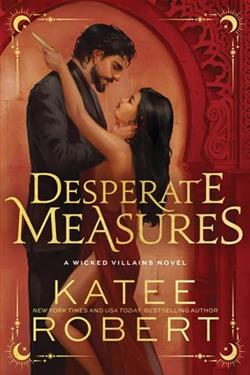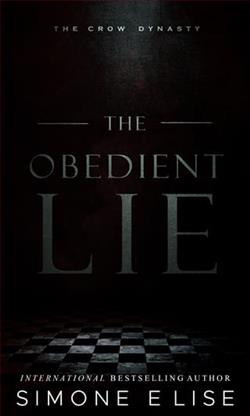Page 10 of I Do, I Do, I Do
Zoe touched the glossy coil on her neck, trying to imagine silk. “It was like lightning flashed out of the ceiling and struck me to the heart. There he was, the handsomest man I’d ever seen, and he had clean fingernails, and he was standing in front of me saying I had hair like midnight silk.”
“Well. I guess I understand why you’d marry a man with no calluses on his hands. I thought for sure you’d made a mistake.” Her mother stared across the table. “Did he say other pretty things?”
Oh, yes. She’d heard poetry from her husband’s lips, but never a coarse word. He believed she was a real lady. She, who had grown up fighting with six brothers, scrapping for a few feet of space that she could call her own. She’d tried so hard to rise above her background, but she hadn’t known if she had succeeded until Jean Jacques Villette came into her life and treated her as if she were made of eggshell, as if she’d never bloodied her knuckles standing her ground.
“When do you expect your husband to return?”
“After he finds gold, I expect. And Ma, we have such plans!” A sparkle jumped into her eyes, and she leaned forward. “When Jean Jacques comes back from the Yukon, we’ll either buy Uncle Milton’s store or design our own. And we’re going to build a big house on Denny Hill like all the swells.”
“But Zoe, what if your husband doesn’t strike it rich up there in the Klondike?”
“There’s something I didn’t tell you, Ma.” She’d feared she would pop her dream bubble if she talked too much about the wonders of her new life. But enough time had passed that she felt secure now. “Jean Jacques comes from a rich family. Prospecting for gold is just a lark for him. An adventure. He’d like to scrape up a fortune so he doesn’t have to depend on family money, but if that doesn’t happen,” she shook her head, marveling, “it won’t matter.”
“You married a rich man?” Her mother leaned back and frowned. If Ma had said it once, she’d said it a hundred times.Stay with your own. If you marry above or below yourself, you’ll wed heartache and sorrow.
Ma’s expression said it cost her dear not to repeat the warning. Instead, she fell silent for several minutes and then asked, “But didn’t you mention that you paid for your husband’s outfit and his passage with some of your reward money?”
“Something went awry with the transfer of funds from Jean Jacques’s accounts back East to his account in the Seattle bank. First it was a problem with his accountant, then the wire service. Everything that could go wrong, did go wrong. Rather than delay his journey I paid for the outfit and passage.”
Her mother’s gaze sharpened. “You do have access to his funds now, don’t you?”
“Actually Jean Jacques sailed before the problem was solved. He had to leave when he did, or the weather would have made reaching the gold fields impossible.”
She didn’t like the way her mother stared, didn’t like the way her explanation sounded a bit airy, like something out of a storybook. The longer Zoe talked, the more inexplicably naive she sounded. Irritated, she lapsed into silence.
“I’m suspicious by nature,” Ma said finally. “So you can take this with a grain of salt. But it doesn’t sound right that this rich husband of yours would go off for months and months without leaving you any money to live on.”
“I have my employment at Uncle Milton’s store, and I still have some of the reward money. Plus, I’ve saved a nice nest egg.” And she had married a wealthy man. Never again would she worry about money. Never again would anyone look down on her. It was a miracle.
But from Ma’s viewpoint, she admitted it did seem peculiar that Jean Jacques would sail away without an apparent worry as to how his new bride would fare. On the other hand, it hadn’t seemed odd at the time. Zoe remembered urging him to go, assuring him that she would manage nicely on her salary from Uncle Milton. She had felt proud when Jean Jacques praised her independence and self-sufficiency.
Ma refilled their coffee cups from the scorched pot on the stove top. “You have time for one more cup before you leave.”
The coal train would take her back to Seattle. Mr. Cummings, the engineer, wasn’t permitted to transport passengers, but he looked the other way if a miner or his family wanted to climb into the caboose.
“I’m sorry I didn’t warn you about the Owner’s Day Parade before you came. I know you’ve never enjoyed the festivities.”
Zoe turned her face to the window, and her lips thinned. She’d been five or six when she realized the elegantly dressed men and women in the carriage parade looked at the people lining the lanes of Newcastle with a mixture of superiority and contempt. That was the year she had overheard one of the men say, “They’re so dirty. And look how they live.” As if they were animals. As if they had a choice about the coal dust and the small company houses.
The following year she had promised herself that she would not scrabble in the dirt for the candy the ladies threw from the carriages. She’d stood upright, her spindly body stiff with pride while pieces of candy pelted her skirt. But it was the only candy she would have until the parade next year, and in the end she had dropped to her knees and snatched at the pieces before someone else got them.
She was eleven before her pride grew stronger than her longing for the candy. But her pride was crushed anyway. She might as well have fought for the candy.
The rich people in the carriages observed the children and people of Newcastle with laughter and nods and occasional pointing, the way they might have viewed dumb beasts in a zoo. As if the visitors were members of a superior species that had never seen or imagined such distasteful creatures or the hovels that furnished their habitat. They looked at Zoe as they passed, and she felt ashamed of the dress she had outgrown, ashamed of her bare feet and the unpainted small house behind her. Their laughter diminished her and made her feel like weeping.
“I hate Owner’s Day,” she said quietly, keeping her eyes on the window. “They come here like feudal lords to view the peasants.”
“Just ignore them like the rest of us do.” Her mother shrugged. “It’s a holiday. The men have a day off. There’s the picnic and dancing afterward. When something nice comes along, Zoe, you grab it.”
“I suppose so,” she said for her mother’s sake.
Ma studied her until Zoe felt heat rise in her cheeks. “You worry me sometimes.”
“Don’t you worry about me, Ma. I’ve got my head on straight.”
“Do you, Zoe? I hope so. Those people in the parade aren’t any better than you and me. The people in Newcastle aren’t rich, they don’t have fancy manners, and they don’t talk pretty, but they’re good, decent, hardworking folks.”
Sometimes Ma layered meaning in her words, and Zoe wondered if this was one of those times. “Are you hinting something about Jean Jacques?”















